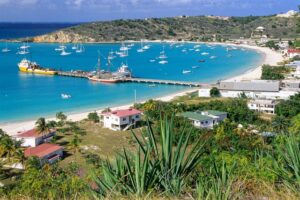Companies can be registered through licensed agents in Anguilla, with all documents filed electronically and approvals issued in as little as 24 hours.
Because of this, setting up a company in Anguilla has become an increasingly popular option for entrepreneurs, investors, and international businesses looking for a straightforward, cost-effective, and tax-neutral jurisdiction.
This article explains everything you need to know about incorporating a company in Anguilla, including the types of entities available, the step-by-step registration process, costs and timelines, tax and legal advantages, and ongoing compliance requirements.
It also addresses common questions about privacy, annual maintenance, and banking for Anguilla companies.
My contact details are hello@adamfayed.com and WhatsApp +44-7393-450-837 if you have any questions.
The information in this article is for general guidance only. It does not constitute financial, legal, or tax advice, and is not a recommendation or solicitation to invest. Some facts may have changed since the time of writing.

Reasons for starting a business in Anguilla
Entrepreneurs may consider investing in Anguilla for several compelling benefits:
- Tax neutrality – Anguilla imposes no corporate income tax, capital gains tax, or withholding tax on offshore income, making it an attractive jurisdiction for global entrepreneurs seeking efficiency.
- Ease and speed of incorporation – The electronic CRES system allows companies to be registered within one or two business days, often the same day, with minimal paperwork.
- Confidentiality – Details of shareholders and directors are not disclosed in public records, offering privacy for business owners.
- Low costs – Government fees are modest (around USD 250 for an IBC), and annual maintenance expenses are generally lower than in other offshore jurisdictions.
- Flexibility – Only one director and one shareholder are required, and they can be of any nationality or residency.
- Global recognition – Anguilla is a well-established offshore financial center regulated by the Anguilla Financial Services Commission, giving credibility to companies formed there.
These advantages make Anguilla especially attractive to entrepreneurs running international trading companies, holding structures, consulting businesses, or asset protection vehicles.
How to Open a Company in Anguilla
For Anguilla company formation, the first step is to decide which type of entity best suits your business goals. The jurisdiction offers three main structures under its corporate laws, each with its own advantages and use cases.
International Business Company (IBC)
The International Business Company (IBC) is the most widely used corporate vehicle in Anguilla. Designed specifically for offshore activities, it provides maximum flexibility and efficiency for international operations.
Key features of an IBC include:
- Exemption from local taxes on income earned outside Anguilla.
- No requirements for local directors or shareholders.
- Only one director and one shareholder are required (they can be the same person or a corporate entity).
- Minimal reporting obligations and no mandatory annual audits.
- Fast incorporation through the electronic CRES system.
An IBC is commonly used for holding companies, international trading, asset protection, or as a vehicle for consulting and service businesses.
Limited Liability Company (LLC)
An Anguilla Limited Liability Company (LLC) functions similarly to its U.S. counterpart. It blends features of a partnership and a corporation, offering flexibility in management and strong liability protection for members.
Key features of an LLC include:
- Owned by members rather than shareholders.
- Members are not personally liable for company debts or obligations.
- Can be managed directly by its members or by appointed managers.
- Flexible internal structure defined by the LLC Agreement.
- No corporate tax obligations for offshore income.
An LLC is often chosen by entrepreneurs who want more control over how their business is run, particularly for joint ventures or smaller enterprises with active involvement by members.
Companies Act Company (CAC)
A Companies Act Company (CAC) is incorporated under Anguilla’s domestic Companies Act. Unlike IBCs and LLCs, which are primarily used for offshore business, CACs are intended for companies that will operate physically within Anguilla.
Key features of a CAC include:
- Suitable for local businesses providing goods and services in Anguilla.
- Subject to local regulations and licensing requirements.
- More compliance obligations than IBCs or LLCs.
This type of company is less common for international entrepreneurs, but it is the appropriate choice for those planning to establish a physical presence and conduct business directly on the island.
How to Register a Company in Anguilla: Step-by-Step Process
Incorporation in Anguilla is handled through licensed registered agents who file documents on your behalf with the Anguilla Commercial Online Registration Network (ACORN), also known as the Commercial Registry Electronic System (CRES).
- Step 1: Choose Your Company Type
Decide whether an International Business Company (IBC), Limited Liability Company (LLC), or Companies Act Company (CAC) best fits your business goals. Most foreign entrepreneurs choose an IBC for offshore activities due to its flexibility and tax neutrality. - Step 2: Select a Company Name
The proposed company name must be unique and not conflict with existing registered names. It must also include an appropriate suffix, such as Limited, Ltd., Corporation, Corp., Incorporated, Inc., or S.A. for IBCs, or LLC for Limited Liability Companies. - Step 3: Appoint Directors and Shareholders (or Members for LLCs)
At least one director and one shareholder are required.- These can be the same individual or a corporate entity.
- There are no residency or nationality restrictions.
- For LLCs, ownership is vested in members, and management can be either member-managed or manager-managed.
- Step 4: Appoint a Registered Agent and Office in Anguilla
All companies must have a licensed registered agent and a registered office on the island. Only local service providers licensed under the Anguilla Financial Services Commission can serve in this role. They handle filings, maintain statutory records, and ensure compliance. - Step 5: Prepare and File Incorporation Documents
Your registered agent will draft and file the required documents electronically:- For an IBC: Memorandum and Articles of Association.
- For an LLC: Articles of Formation and LLC Agreement.
- For a CAC: Incorporation documents under the Companies Act.
- Step 6: Pay the Incorporation Fee
Government fees are relatively low compared to other jurisdictions:- An IBC requires a filing fee of around USD 250.
- Additional professional or service fees apply depending on the registered agent.
- Step 7: Receive the Certificate of Incorporation
Once processed usually within 24 hours to 2 business days, the company will receive its Certificate of Incorporation, constitutional documents, share certificates (for IBCs), and proof of government filing. - Step 8: Complete Post-Incorporation Formalities
After incorporation, companies typically:- Issue shares (for IBCs) or finalize membership agreements (for LLCs).
- Create internal records such as by-laws, registers of directors and shareholders, and share certificates.
- Open a corporate bank account with a financial institution that accepts Anguilla companies.
- Put in place annual compliance procedures with the registered agent.
How much does it cost to set up a company in Anguilla?
In Anguilla, the first-year cost to set up a company ranges from approximately USD 850 to 1,500 for an IBC, with LLCs and Companies Act Companies slightly higher depending on government and service provider fees.
This combination of speed and affordability is one of Anguilla’s strongest advantages, as both government fees and service provider costs remain highly competitive compared to other offshore financial centers.
Government Fees
- International Business Company (IBC): The base incorporation fee is approximately USD 250.
- Limited Liability Company (LLC): Fees are comparable to IBCs, generally starting at USD 250–300.
- Companies Act Company (CAC): Fees vary depending on the level of local regulation and licensing, but tend to be slightly higher than for offshore entities.
These fees are payable directly to the Anguilla government upon incorporation and annually for renewal.
Service Provider Fees
Since companies must be incorporated through a licensed registered agent, additional fees will apply. These can include:
- Incorporation package fees: Ranging from USD 600–1,200 depending on the provider and services included.
- Annual maintenance fees: Covering registered office, registered agent services, and compliance filings, usually USD 400–800 per year.
- Optional services: Such as drafting shareholder agreements, nominee directors, or opening international bank accounts, charged separately.
For most entrepreneurs, the first-year cost of incorporating an IBC in Anguilla ranges from USD 850–1,500 (including government and agent fees). Renewal costs in subsequent years are usually lower, limited to annual fees and agent services.
How long does company registration in Anguilla take?
In practice, many Anguilla companies can be set up in a single day, making it one of the fastest incorporation jurisdictions in the world.
- Name approval: Instant, if available.
- Document preparation: Same day by the registered agent.
- Government processing: 24 hours through the CRES/ACORN system.
- Delivery of documents: Within 1–2 business days, depending on whether you request physical or digital certificates.
Doing Business in Anguilla: Do Anguilla companies pay taxes?

Anguilla is considered one of the most favorable offshore jurisdictions because of its tax neutrality and legal protections. For entrepreneurs, this translates into straightforward administration and predictable costs.
- No corporate income tax on profits earned outside Anguilla.
- No capital gains tax, inheritance tax, or gift tax.
- No withholding tax on dividends, interest, or royalties paid to non-residents.
- No value-added tax (VAT) or sales tax on international business activities.
This makes Anguilla especially attractive for companies engaged in international trade, consulting, holding structures, or asset protection.
Ongoing Compliance and Maintenance
Although Anguilla companies benefit from low regulatory requirements, some ongoing obligations must still be met to remain in good standing.
Annual Fees and Renewals
- Companies must pay annual government renewal fees (around USD 250 for IBCs).
- A registered agent must be retained, with annual service fees typically ranging from USD 400–800.
Annual Returns
- Companies are required to file an annual return through their registered agent.
- This return confirms company details such as directors, shareholders, and beneficial ownership.
Beneficial Ownership Reporting
- Anguilla complies with international standards on transparency.
- Beneficial ownership information must be filed with the Commercial Registry, though it is not made public.
Economic Substance Requirements
- Companies engaged in certain relevant activities (such as banking, insurance, fund management, or shipping) may need to demonstrate economic substance in Anguilla.
- This could include having local staff, office premises, or management activities conducted from the island.
Registered Office and Agent
- Every company must maintain a local registered office and a licensed registered agent in Anguilla at all times.
Together, these requirements are relatively light compared to many other jurisdictions, allowing entrepreneurs to operate with minimal ongoing bureaucracy while still maintaining compliance with international standards.
Pained by financial indecision?

Adam is an internationally recognised author on financial matters with over 830million answer views on Quora, a widely sold book on Amazon, and a contributor on Forbes.



